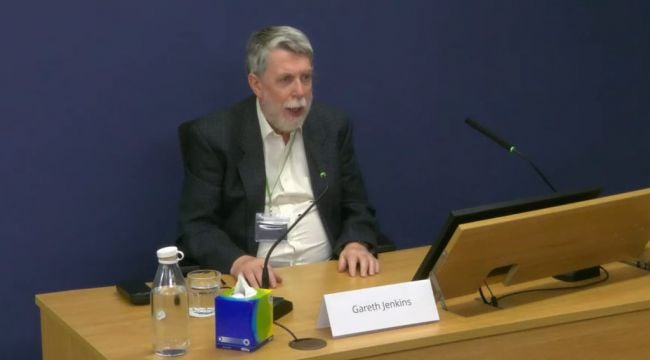A former senior Fujitsu engineer has claimed the UK Post Office were “trying to put words into my mouth” when disclosing issues with the Horizon IT system.
Gareth Jenkins also said he “would have done things differently” as a court witness for the Post Office in prosecutions against subpostmasters.
Mr Jenkins worked at Fujitsu, formerly known as International Computer Limited, for the whole of his professional career before retiring in 2015, and had been a “distinguished engineer” since the mid-1990s.
His evidence about the Horizon system was used in the prosecutions of many subpostmasters including Seema Misra, who received a 15-month prison sentence while eight weeks pregnant in November 2010.
Previous witnesses to the inquiry have claimed Mr Jenkins may have committed perjury due to his failure to disclose knowledge of bugs in the Horizon system to the subpostmasters.
In his third witness statement for the inquiry, Mr Jenkins made personal written apologies to some of the subpostmasters and said he was “truly sorry” for Mrs Misra’s wrongful conviction.
He said: “I would like to make clear that I feel deeply affected by the cases I played a part in. I have wanted to explain my part in them.
Have you been affected by the Post Office Horizon scandal? You can share your story now at #InYourOwnWords, our listening project for people impacted by the scandal 📢 https://t.co/WS7AtB2Y1j pic.twitter.com/Vj7j3COtTt
— Post Office Horizon IT Inquiry (@PostOffInquiry) June 24, 2024
Advertisement
“I have apologised to those individuals who were wrongly convicted in the case studies I have addressed and I repeat again how sorry I am.”
Giving evidence at the inquiry on Tuesday, Mr Jenkins said the Post Office made a series of direct approaches to him with “odd requests out of the blue”.
Asked by inquiry counsel Jason Beer KC if he felt under pressure from the Post Office or their lawyers to refute any suggestions there were issues with Horizon, he said: “There were certainly cases where they were trying to put words into my mouth.”
Asked how he felt about it, Mr Jenkins told the inquiry: “I just took it as being the way these things happened.
“I wouldn’t allow them to put words in my mouth unless I agreed with them.”
The inquiry heard Mr Jenkins worked on Horizon Online for Fujitsu from around 2008 onwards.
Mr Jenkins said he did not accept the finding of the of the Horizon Issues judgment in December 2019 that Horizon was not remotely robust, as he felt the system was “working well”, and denied he was the “chief architect” of the system.
He told the inquiry he never had any oversight of all bugs, errors, defects within the system as the “relevant person” would be allocated defects through a database.
Asked by Mr Beer why the Post Office turned to him specifically as a witness in criminal prosecutions, Mr Jenkins said: “I think it was felt that I was in a good position of turning some of the technical jargon into something that lay people could understand better.”
Asked if it occurred to him, he should find out more about the cases not referred to him when representing the Post Office in court, he told the inquiry: “As I’ve said before I was confident, and possibly wrongly so, that when problems did occur, they were quickly fixed.
“I’d have to say that with hindsight, I would have done things differently.”
Mr Jenkins added: “I was primarily looking at what was happening in a particular branch at a particular time.
“I didn’t see the giving of evidence as being any different from what I was doing in my day-to-day support.”
More than 700 subpostmasters were handed criminal convictions between 1999 and 2015 when errors in the Post Office’s Horizon IT system meant money appeared to be missing from many branch accounts when, in fact, it was not.
It has been branded the biggest miscarriage of justice in British legal history.
Mr Jenkins is due to give evidence for four consecutive days up to Friday, the longest run of questions any witness has faced so far.
The inquiry continues.







